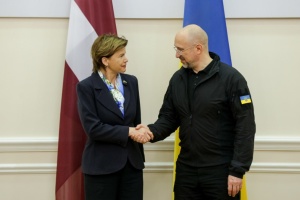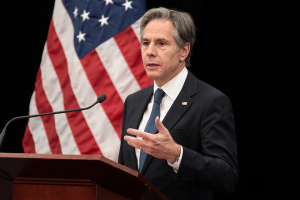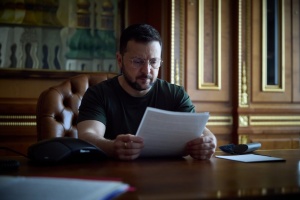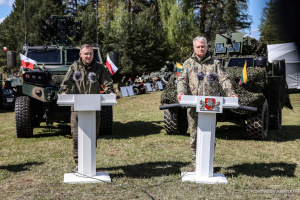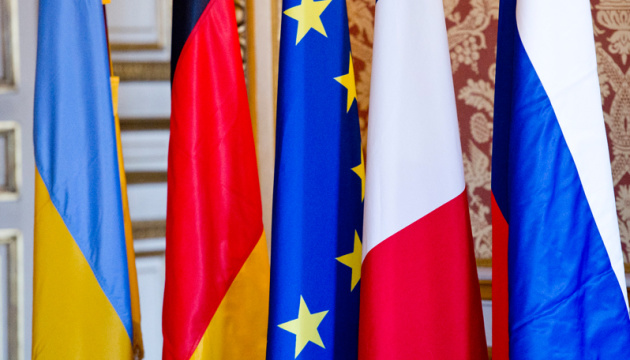
What to expect from virtual meeting of Normandy Four ministers
The decisions of the Normandy Format summit in Paris are being delayed, Ukrainian Foreign Minister Dmytro Kuleba said on April 28. "And we need to give impetus to their implementation so as to open the way to the next summit in Berlin," he said, adding that "we need to move towards the end of the war, the de-occupation of Ukrainian territories and, finally, to the cessation of Russian aggression in general."
On the eve of foreign ministers' meeting
German Foreign Minister Heiko Maas announced the ministerial meeting on the Internet on April 22. "We agreed and are very pleased that a ministerial-level videoconference will take place," Maas said, adding that such an agreement was reached in a phone call between the foreign ministers of Germany, France, Ukraine and Russia.
The ministers are maintaining contact, and the German government is working on this subject at the expert level, in particular, with French colleagues, according to German deputy government spokesperson Ulrike Demmer. The theme of contacts is to establish a true ceasefire and create new disengagement areas. It was reported that Russia had offered resistance to the negotiations until the last moment but had agreed to them under pressure from Germany.
On April 27, Russian Foreign Minister Sergei Lavrov said: "We are now exchanging proposals on what should be the agenda for this video contact scheduled for the end of the week, as far as I know." At the same time, according to Lavrov, the proposals of the German Foreign Ministry put on the agenda do not suit Russia: "Everything there is only about a new exchange of detained persons, about mine clearance, ensuring security, ensuring access for the OSCE Special Monitoring Mission." And, of course, Russia wants decisions on legalizing puppet quasi-entities "DPR" and "LPR."
Normandy Format
The Normandy Format is four-party meetings (Ukraine, Germany, France and Russia) between the heads of the four states or ministers where they discuss Russia's armed aggression against Ukraine. The name comes from a meeting of the heads of the four states held on June 6, 2014 in the town of Benouville, Normandy, France, to mark the 70th anniversary of Operation Overlord, the landing operations of anti-Hitler coalition forces in 1944.
The Minsk-1 agreements were approved and signed in September 2014 with the participation of the OSCE. The next (second) meeting in the Normandy Format took place in Milan, Italy, on October 16-17.
The third meeting took place in Minsk, Belarus, on February 11-12, 2015. The negotiations lasted for 17 hours and resulted in the signing of a declaration in support of a set of measures to implement the Minsk agreements. They have not been implemented so far because Russia refuses to fulfill the security part of the agreements, insisting on the priority of the political part (holding elections in occupied territories).
The withdrawal of armaments of a caliber less than 100 mm to a distance of 15 kilometers from the contact line was agreed upon at the Normandy Four meeting in Paris on October 2, 2015.
In Berlin, on October 19, 2016, the leaders of the Normandy Four countries agreed on the development of a road map for the implementation of the Minsk agreements. Ukraine's unwavering position is that the fulfillment of security conditions, the ceasefire, the withdrawal of foreign troops, adherence to the regime of disengagement of military hardware, ensuring unhindered access for OSCE representatives, the release of hostages must precede the transition to the implementation of the political part of the agreements.
On December 9, 2019, Paris hosted a summit with the participation of the leaders of Ukraine, France, Germany and Russia. The meeting was held after a three-year pause and was the first one for President Volodymyr Zelensky. The purpose of the summit was to approve a new sequence of the implementation of the Minsk agreements and to discuss the so-called "Steinmeier formula."
The Paris meeting brought some success, first and foremost, in the exchange of prisoners. The Normandy Four also agreed to extend the mandate of the OSCE observation mission, in particular, to conduct observation not only in the daytime because Russian troops mainly shell Ukrainian positions at night.
The participants in the summit signed a summary document entitled "Paris "Normandie" Summit - Common Agreed Conclusions." These agreements imply, in particular, the incorporation of the "Steinmeier formula" into the Ukrainian legislation.
'Steinmeier formula'
The Steinmeier formula is an action plan proposed back in November 2015 by then-German Foreign Minister Frank-Walter Steinmeier (now the federal president of Germany) to settle the war in eastern Ukraine. It is to determine the sequence of local elections conducted there under Ukrainian law and under the supervision of the OSCE.
The 'formula' does not say whether the withdrawal of Russian troops from Donbas and the return of control to Ukraine over its state border should precede elections. Therefore, the Russian side interprets this as a permit to keep their troops and armaments in Donbas, although their withdrawal is envisaged by the Minsk agreements. Ukraine cannot a priori consider the holding of elections by "OSCE standards" if they took place in non-government-controlled areas. And even with the changed demographic structure there: during the war, about a million Ukrainian citizens were forced to move from Donetsk and Luhansk regions, while the local self-proclaimed authorities transferred their abandoned apartments to an unknown number of Russians by handing them documents of unrecognized "republics."
Former U.S. Ambassador to Ukraine William Taylor considers the "Steinmeier formula" a bad idea. According to him, it is necessary to get the Russians out of Donbas as soon as possible. "Mr. Putin knows how to get a ceasefire. He knows how to end the sanctions. He knows how to make himself better off in these new times, in these new circumstances. And it is to withdraw from Donbas. So those are the kinds of things that he needs to recognize and will," the diplomat said.
Implementation of agreements
Two points of the agreement reached during the Paris summit - on the exchange of detained persons and the disengagement of troops and military hardware from the contact line - have been partially implemented.
Effective attempts to withdraw troops from the contact line were made by the Ukrainian leadership before the Paris summit.
On June 26, 2019, the Ukrainian military left their positions near the Stanytsia Luhanska checkpoint. On October 29, 2019, the disengagement of troops and military hardware started on both sides at area No. 2 near the village of Zolote-4 in Luhansk region. The disengagement of troops at area No. 3 near Bohdanivka and Petrivske in Donetsk region began on November 9, 2019.
No arrangements on new disengagement areas have been made since then. According to Ukraine's representative in the security subgroup of the Trilateral Contact Group, Deputy Commander of the Joint Forces Operation Bohdan Bondar, said that the proposals are "being blocked by the Russian side in order to disrupt the implementation of agreements reached at the previous Normandy Format summit of December 9 and prevent the prospect of a new meeting of the leaders of the four countries."
At the same time, according to the main intelligence department of the Ukrainian Defense Ministry, the invaders lay additional mines on potential disengagement areas. In addition, they hide D-30 122mm howitzers and Gvozdika self-propelled howitzers in this area.
Military expert Valentyn Badrak said that "as soon as the concessions and the disengagement of troops began, we actually saw Russian aggression growing and, as a result, we have more casualties, constant shelling, constant attacks, and acts of sabotage."
Since the beginning of the year - after the Paris summit - 47 Ukrainian soldiers have already been killed, and several servicemen have been wounded every day.
The main obstacle to reaching agreements is Russia's reluctance to recognize itself as a party to the conflict in eastern Ukraine.
Meanwhile, Ukrainian President Volodymyr Zelensky expressed confidence that during his term in office he will be able to end the war in Donbas. He stated this in a film titled "The Year of President Zelensky," which premiered in the first year of his election.
"There might be partial victories, but we will wait for the full result when we really return our territories to Ukraine. We need a little more time," the president added.
Former U.S. Special Representative for Ukraine Negotiations Kurt Volker said at the online Kyiv Security Forum on April 24 that Zelensky's position and his intention to take concrete steps to achieve peace in Donbas are a manifestation of tactical wisdom as it does not give Russia grounds to blame Ukraine for disrupting the Minsk agreements and demanding that the West lift the sanctions. "We can all see that it's really Russia that is failing to implement the Minsk agreements [...] We all know that it's really in Russia's hands whether they choose to bring peace to eastern Ukraine or not," Volker said.
Expert assessments
Senior Expert on Eastern Europe and the European Neighborhood Program "Europe's Future" Miriam Kosmehl expects "certain but minor further steps" from a virtual meeting of the Normandy Format ministers. She expressed hope that it would be possible to achieve really important things only at the next summit. However, such a summit seems to be "far away" as little has been realized from what was agreed upon in Paris in December 2019, except for the exchange of detainees, which is, of course, very important.
What worries the expert is that the ceasefire is violated again and again.
Susan Stewart, an expert at the Berlin-based German Institute for International and Security Affairs (SWP), who studies the Minsk process, also said that most of the points agreed upon at the Paris summit in 2019 have not yet been completed. Therefore, it is difficult to imagine what can be achieved at a ministerial videoconference, "except to repeat the statements of the will of all parties to continue to work on the implementation of these points."
The most worrying thing, she said, is the worsening humanitarian situation in the conflict zone, especially in the occupied territories.
"Russia's agenda on Ukraine has not changed, and Putin and his foreign policy elite have been very adept at using the weaknesses of others," the analyst said.
A Ukrainian analyst, Yevhen Director of the Institute of World Policy Yevhen Mahda, believes that the meeting of foreign ministers of the Normandy Four countries will not bring any breakthrough in the process of resolving the situation in Donbas. Lavrov, according to the expert, is expected to insist on the introduction of amendments to the Constitution of Ukraine for the sake of securing the "special status of Donbas", but this requirement is unacceptable for Ukraine. There will also be the debate around the conclusions adopted after the Normandy Format summit in Paris, and each of the negotiating parties will propose their own interpretation of the sequence of implementation of these agreements.
"I would venture to say that a meeting of the Normandy Format leaders will not take place this year, as public contradictions remain insurmountable. However, this does not mean that Moscow is ready to leave Donbas or abandon its desire to impose its own game on Ukraine without any mediation," Mahda said.
Oleksandr Volynskyi, Olha Tanasiichuk

